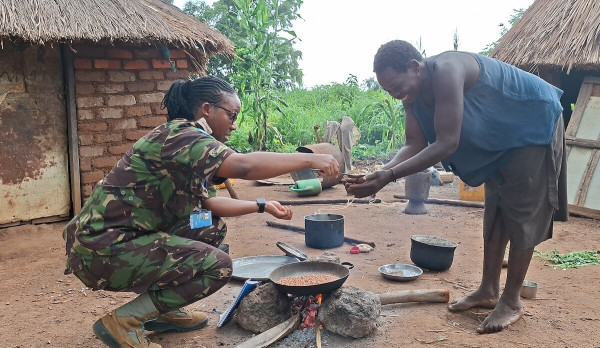
Once, almost 400 people called Mosso, some 50 kilometers from Tambura, home. Isolation and years of insecurity-induced displacement have reduced the current population to 15 hardy souls.
“Killings and ambushes created fear and made this happen,” says one of them, Rebecca Evariste, a mother of nine. “The rest have fled,” she adds, mentioning Yambio, Ezo, Nzara and Bagidi as some of their favoured destinations.
Reduced numbers further increase the villagers’ sense of being cut off, not least from goods and services. To get hold of even the most basic of necessities, they must go to a relatively distant market, at great risk. Their prospects of accessing healthcare are equally bleak.
“Even if you have money, it’s just too dangerous to travel to the market, and if you are sick, you have to make do with whatever herbs you can find.”
In fact, these difficulties are shared by several communities, representing different ethnic groups, in the greater Tambura area, with many having left their homes for a handful camps for internally displaced persons.
While the primary responsibility for protecting civilians lies with the national government, the United Nations Mission in South Sudan (UNMISS) is doing its best to support efforts to keep citizens safe.
In a bid to better protect as many civilians as possible from the increase of violence having been observed in this part of Western Equatoria, the peacekeeping mission has increased its patrols. Apart from almost forgotten, disappearing villages like Mosso, Blue Helmets visit all camps for internally displaced persons, regardless of what ethnic group those seeking shelter belong to.
Hopefully, residents of these camps take as much comfort in seeing UN vehicles and friendly, impartial peacekeepers as the people of Mosso do.
“We have come to know and enjoy that calm is likely to remain for the next two or three days after the patrols and visits here. During that time, there will be no ambushes on the road,” says Ms. Evariste.
Some of the people having been displaced from Mosso make the most of these windows of opportunity and relative security. One of them is William Anthony, who currently stays in Bagidi with his family.
“I came back yesterday to uproot cassava and harvest some farm produce, and because of the timing, I am confident that I will be able to return safely to my family” he says.
Among the few remaining residents in Mosso, their course of action will largely depend on developments on the ground.
“Those who fled are suffering and the government should help them return. People are likely to come back if they see security forces being deployed and health workers return. Regular UN patrols, maybe once a week, will also help convince them,” says John Nkumbo, a father of seven whose family is separated from him, currently in Bagidi.
The UNMISS patrol team leader, Major Lul Brhane, reassured Mr. Nkumbo, at least when it came to the latter part of his plea.
“We will continue our patrols. We are here because of you, because your safety remains our top priority.”
Distributed by APO Group on behalf of United Nations Mission in South Sudan (UNMISS).


